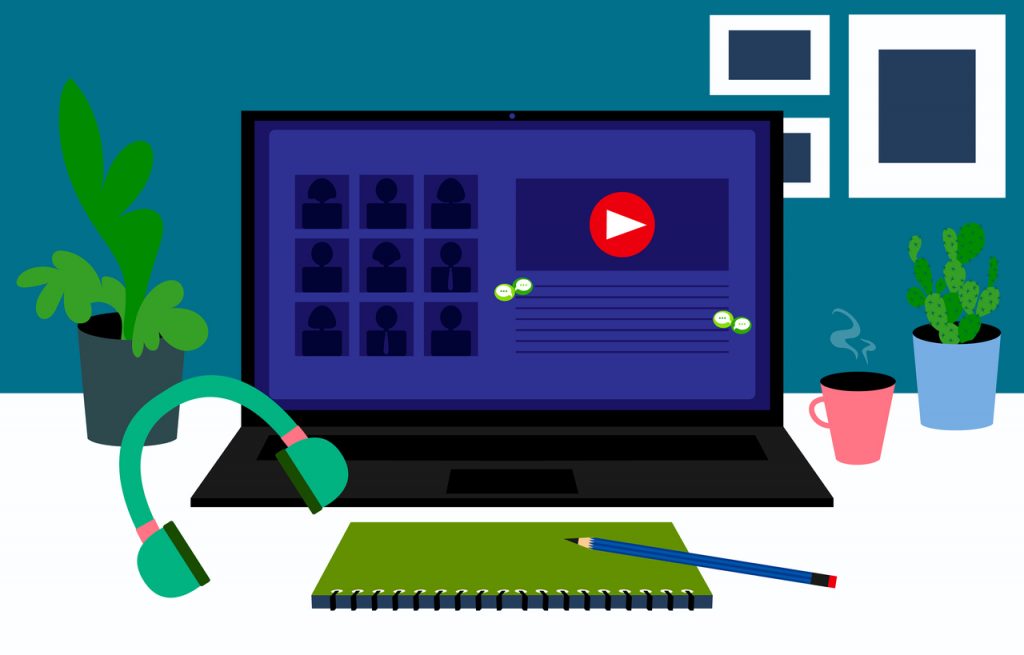901 Tower Drive • Suite 420 •
Troy, Michigan 48098
• P: 248.269.1122 •
E: bianchipr@bianchipr.com
901 Tower Drive • Suite 420 •
Troy, Michigan 48098
• P: 248.269.1122 •
E: bianchipr@bianchipr.com

Despite the changes that the global COVID pandemic have brought upon us all over the past year, those of us involved in the PR world have remained steadfast to the tactic of helping our clients take advantage of speaking engagements, or encouraging them to host their own, as part of our communications toolbox.
After all, despite having to move to an all-virtual format, hosting or participating in panel discussions that tackle topics of interest in your industry is a great way to showcase thought leadership and bump-up brand recognition with target audiences, such as customers, prospects, potential recruits and journalists.
However, planning and moderating a virtual panel discussion is quite different than doing one in person, for several reasons – some obvious, some perhaps not.
Moderating a panel in a virtual format does not allow you or the panel members to pick up on live audience cues or crowd energy during the event that can provide crucial feedback.
There also isn’t the same type of opportunity to network or “read the room” ahead of time to get a better feel for your audience. Plus, you won’t likely have a chance to meet with the panel participants in person during the planning process or for any rehearsals – you’ll have to do that virtually as well.
Moderating a successful and engaging virtual panel requires you to take several things into account … and ask yourself a LOT of questions … well before the panel takes place, during the early and ongoing planning stages and all the way up to the event itself.
But if your efforts are successful, a virtual panel can result in an experience that is every bit as successful and rewarding for all involved!
So if you’ve been given this task, or are thinking about taking it on, here are five tips for planning and moderating a virtual panel discussion:
1. How Will You Operate?
One of the most important things to consider for a virtual panel, after the overall topic has been selected, of course, is what virtual platform will be used to host the event. Be sure to consider all of the features and options you might like to have within your platform of choice and the constraints different platforms may have.
As the host or moderator, will you have the ability to control the microphone of the participants so that you don’t end up with people talking over one another or getting interrupted? Will you be controlling the screen and uploading each panelist’s presentation to potentially keep things smooth … or will they be uploading their own work? How will you configure the screen when one panelist is speaking and others are not?
What is the process for participants to submit questions to the panelists? Will they be able to ask questions directly via audio when prompted, or will they be asked to submit questions in writing before and/or during the event? Does the platform offer a chat box function? How much time will you need for your introductions and closing, and does the platform have any limitations relative to time or number of attendees?
The more questions you can ask yourself upfront, the better. The last things you want while hosting a virtual discussion are unexpected operational surprises.
2. The Pre-Game
We recommend doing both an introductory planning meeting and a rehearsal meeting with your selected panelists ahead of the event.
The introductory meeting should lay all the groundwork so that everyone participating knows what each person will be speaking on, deadlines to submit materials, the time limits for each person / section, how you might signal their attention when their time is wrapping up, what the flow of the event will be, what they are responsible for during the event, how the Q&A portion will be handled, etc.
This is also the time to find out if any panelists need any special tech considerations, such as wanting to include a video clip or an interactive element to their portion of the session.
For your official rehearsal meeting, do a full dry run of the event to identify any issues that need troubleshooting, from tech hiccups, to awkward sections of the presentations or transitions between segments that could be tightened up, etc.
Be sure to test any “extras” that will be part of the event, such as interactive portions and video clips for functionality and to note the time length of each carefully.
On the day of the event, ask your panelists to log-in to the platform at least 15-20 minutes prior to the official start time.
3. Question the Questions
Often, people get so focused on the details and execution of the panel discussion that they take the Q&A portion of the event for granted. They think “we’ll leave about 15-30 minutes at the end for Q&A” and leave it at that. But many attendees find the Q&A portion to be the most enlightening part of the panel, and without proper planning upfront and some guardrails to keep it on track, the Q&A portion of a virtual event can potentially swerve into disaster territory..
Always have a list of a couple of prepared questions for each panelist at the ready in advance. That way, if the attendees aren’t a very outgoing group, you won’t be left with an awkwardly silent situation where your panelists are waiting to take questions that never come!
You might also consider gathering a question or two from each panelist themselves in advance – ones that they can prepare answers for ahead of time that would be beneficial to the audience and that might inspire other inquiries. Sometimes, if the attendees see other questions being answered, they will feel more comfortable speaking up and asking some of their own.
4. The Set-Up and Pitch
Give the same detailed level of thought to your audience participants as you do to the agenda and to experts who will appear on the panel you’re moderating.
When deciding what time of day the panel will be broadcast, remember to factor in different time zones and keep in mind that many people these days have a bit of “Zoom fatigue” from taking part in multiple virtual meetings and events throughout their work days.
, In your promotion of the virtual panel, underscore why the event will be beneficial and worth the audience’s time by tying in your theme to timely industry trends and issues. And work to make the attendee experience as easy, simple and enjoyable as possible.
Also consider the nuts and bolts of attending: Are the instructions for registration, logging-in and submitting questions clear and concise? Has your registration process been tested for usability? Can anyone attend the event or will you pitch a limited list of prospects? Will the microphones for the attendee be set to mute or will you allow them to speak? Will you provide copies of the panelists’ presentations after the event to those who registered? Will the panel be recorded and will you make the recording available to registrants?
5. Keep Their Eyes on the Prize
Online audiences can be tough. People working remotely can have a slew of distractions going on around them and it’s easy to be tempted to check emails and texts or multi-task when taking part in a virtual event.
That’s why, as moderator, it’s important to try and engage and hold their attention as much as possible by incorporating audience “calls to action” throughout the event.
Consider including live audience polls or surveys between sections. Instead of waiting to do all your Q&A at the end of the presentation, consider planning Q&A sessions at certain points throughout.
If you do have eye-catching video segments or other visual elements, be sure to spread them out over the course of the discussion, rather than front-loading everything into the intro portion.
Make sure that no one section or presentation is too long. Mix things up, think of variety and don’t spend too much time on one slide / section / person.
Remember that people are spending more time than ever these days receiving their news and entertainment from social media sites and have become very accustomed to visuals and concise, quick-cut transitions, compacting attention spans ever more!
Think about what your attention span is like when you’ve participated in a virtual event as an audience member – what held your attention? What had made certain virtual events feel more worthwhile to you compared to others?
By embracing these five tips when planning and moderating a virtual panel, you can make your next virtual panel discussion a rousing success for your organization, your panelists and your audience.
We welcome your input. What tips would you offer virtual panel organizers and moderators?

Author: Leslie Dagg
Leslie is an account supervisor at Bianchi PR with 19 years of B2B PR experience representing clients across multiple industries.
You may also be interested in: